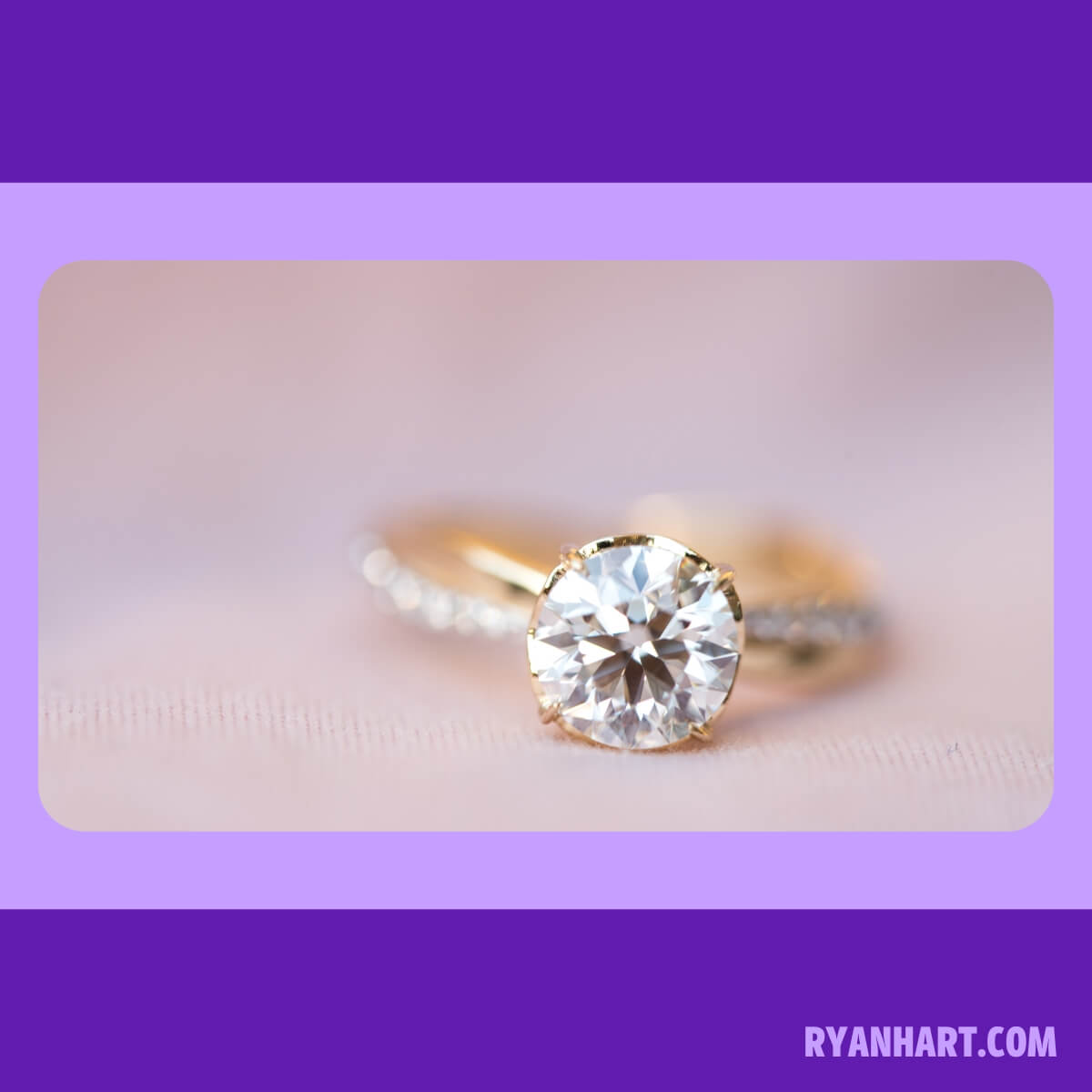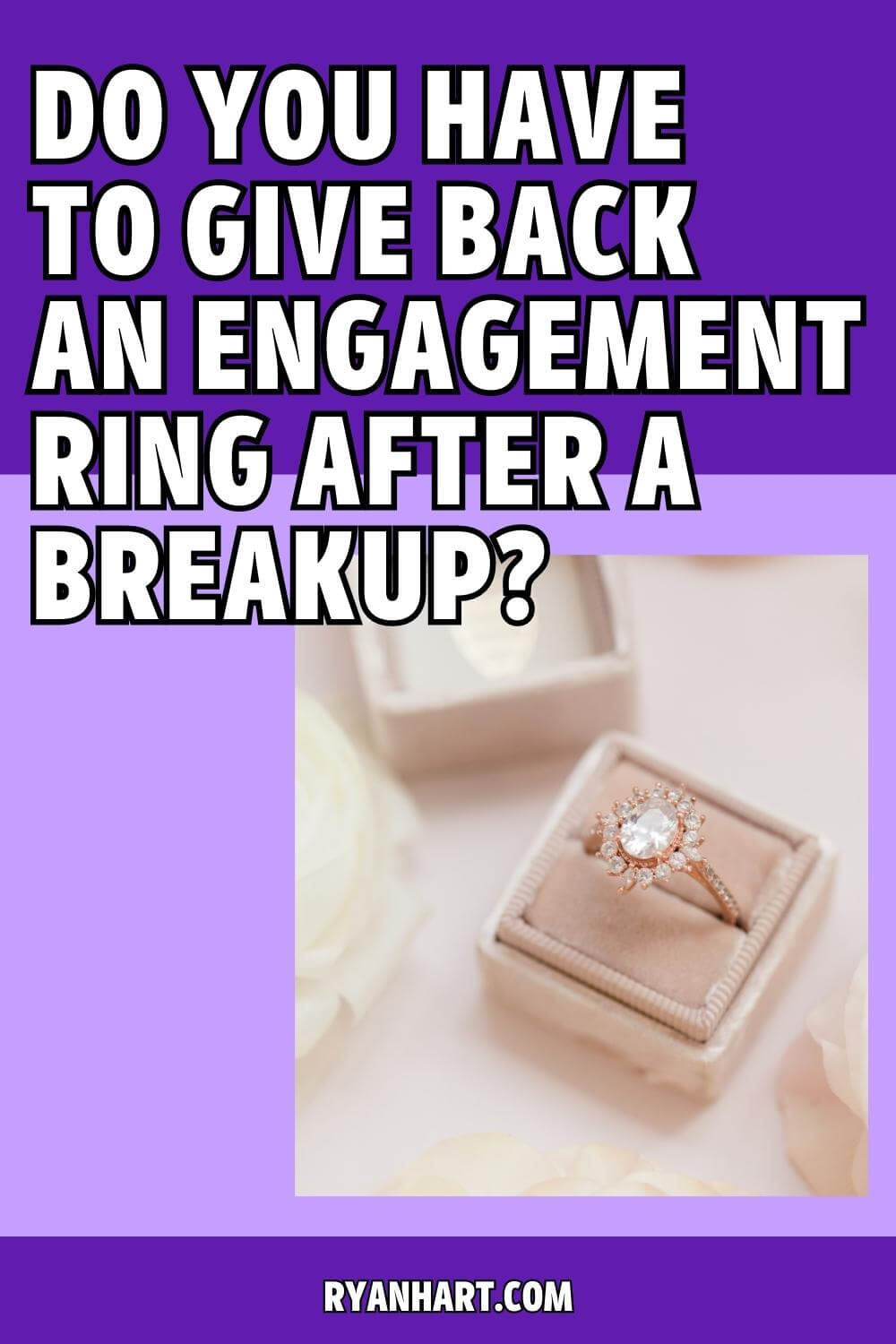Do You Have to Give Back an Engagement Ring After a Breakup?
by Ryan Hart | Updated on May 13, 2024 | Post may contain affiliate links. As an Amazon Associate we earn from qualifying purchases.
The process of breaking off an engagement can be complex and emotional, and deciding what to do with the engagement ring can add to the stress.
Many people wonder if they are legally required to give back the ring or if they are entitled to keep it. The answer is not always straightforward, as it depends on state laws and the circumstances surrounding the breakup.
In general, if you were the one who received the engagement ring and the engagement is called off, you may be required to return the ring to your ex-fiancé. However, there are some exceptions to this rule. For example, if the ring was given to you as a gift, you may be able to keep it.
Ultimately, the decision of whether or not to return the engagement ring is a personal one that should be made on a case-by-case basis.

Are Engagement Rings Gifts?
When you receive an engagement ring, it is not just a piece of jewelry. It symbolizes your partner’s love, commitment, and promise to marry you. But what happens to the ring if the engagement ends? Do you have to give it back?
Firstly, you must understand what a gift is. A gift is a voluntary transfer of property from one person to another without consideration or payment.
There are two types of gifts: unconditional and conditional. It is common for engagement rings to be considered conditional gifts. This means that the gift is given with the expectation that the recipient will fulfill certain conditions, such as getting married. If the conditions are not met, the gift giver has the right to ask for the gift back.
However, some states consider engagement rings as unconditional gifts. This means that the gift is given without any conditions, and the recipient has the right to keep the gift even if the engagement ends.
Engagement rings are either considered conditional or unconditional gifts depending on the state laws and the specific circumstances of the gift.
Generally, if the ring was given on a special occasion, such as a birthday or anniversary, it is more likely to be considered an unconditional gift. If the ring was given with the explicit expectation of marriage, it is more likely to be considered a conditional gift.
Legal Aspects of Returning Engagement Rings
This section discusses the legal implications of returning engagement rings, including conditional vs. unconditional gifts, fault vs. no-fault approach, and engagement ring laws by state.
Conditional vs. Unconditional Gifts
In the eyes of the law, the engagement ring can be classified as either an unconditional or conditional gift. An unconditional gift is given without any conditions or expectations, and once given, it becomes the property of the recipient.
A conditional gift, on the other hand, is given with the expectation that something will happen in return. In the case of an engagement ring, the condition is that the recipient will marry the giver.
Fault vs. No-Fault Approach
When it comes to determining who gets to keep the engagement ring, some states take a fault-based approach, while others take a no-fault approach.
In a fault-based state, the person who broke off the engagement may be required to return the ring. In a no-fault state, it doesn’t matter who broke off the engagement; the ring goes to the person who received it.
Engagement Ring Laws by State
Engagement ring laws can vary widely from state to state. In some states, engagement rings are considered conditional gifts and must be returned if the engagement is called off. In others, the ring is considered an unconditional gift and belongs to the recipient.
Some states have adopted a hybrid approach, where the outcome depends on who broke off the engagement or whether the ring was given on a special occasion.
If you are facing a dispute over an engagement ring, seeking legal advice from an attorney specializing in family law is important.
Special Circumstances for Engagement Rings
Engagement rings can be more than just a symbol of love and commitment. They can also have sentimental or monetary value beyond their purchase price. In some cases, engagement rings may have special circumstances that affect whether they need to be returned after a breakup.
Family Heirlooms
If the engagement ring is a family heirloom, the decision of who gets to keep the ring after a breakup can be more complicated. For example, the ring may have been passed down through generations of the groom’s family and may carry significant sentimental value.
In this case, it may be best to discuss the best course of action with the family members involved. If the bride-to-be has formed a close relationship with the groom’s family and they are comfortable with her keeping the ring, that may be a viable option.
Alternatively, the ring may need to be returned to the groom’s family to maintain the family’s traditions.
Written Agreements
Sometimes, couples may have a written agreement regarding the engagement ring that can affect whether it needs to be returned after a breakup. For example, if the couple has a prenuptial agreement in place, that agreement may specify how the ring will be handled in the event of a breakup.
Similarly, some couples may have a written agreement that specifies who gets to keep the ring if the engagement is called off. If such an agreement exists, both parties should abide by its terms.
If there is no written agreement in place, the decision of who gets to keep the ring may depend on the circumstances surrounding the breakup.
For example, if the bride-to-be initiated the breakup, it may be more appropriate for her to return the ring to the groom. Conversely, if the groom initiates the breakup, he may be more likely to let the bride keep the ring as a gesture of goodwill.
Etiquette and Emotional Factors
When returning an engagement ring after a breakup, certain etiquette and emotional factors must be considered. While the law may dictate whether you have to return the ring, other considerations may come into play.
First and foremost, it’s essential to consider the ring’s sentimental value. If the ring has significant emotional value to you, it may be challenging to part with it. In this case, it’s important to communicate your feelings with your ex-partner and try to agree on what to do with the ring.
On the other hand, if the ring doesn’t hold much sentimental value to you, it may be easier to return it. In this case, it’s important to do so in a timely manner and with respect for your ex-partner’s feelings.
Regarding etiquette, returning the ring if the engagement is called off is generally considered appropriate. However, if the ring was given as a gift for a special occasion, such as a birthday or anniversary, keeping the ring may be more acceptable.
Ultimately, the decision to return an engagement ring after a breakup is a personal one that depends on the individual circumstances. It’s important to consider both emotional and practical factors when making this decision and to communicate openly and honestly with your ex-partner throughout the process.
Bottom Line

In summary, the question of whether you have to give back an engagement ring after a breakup is a complex legal issue that varies by state. While some states treat engagement rings as conditional gifts, others consider them as consideration for a contract. This means that your legal options may depend on where you live.
If you are the recipient of the engagement ring, you may be required to return it to the giver in some situations. For example, if the ring was given as a conditional gift, and the condition was not met, you may have to return it. However, if the ring was given as an unconditional gift, you may be able to keep it.
If you are the giver of the engagement ring, you may have the right to take it back if the engagement is broken off. This is particularly true if you were the one who proposed and fulfilled your obligation to marry.
It’s important to note that the laws surrounding engagement rings can be complicated, and it’s always best to seek legal advice if you are unsure about your rights and obligations.
Whether you decide to keep the ring as a reminder of the relationship or return it to your ex-partner, it’s important to remember that the wedding ring symbolizes a commitment that was not fulfilled.

Ryan Hart is a licensed insurance agent, writer, and former home designer. He is on a mission to help couples protect their homes in retirement with life insurance and annuities.
Want to connect with Ryan? Click here to get his FREE retirement planning newsletter
